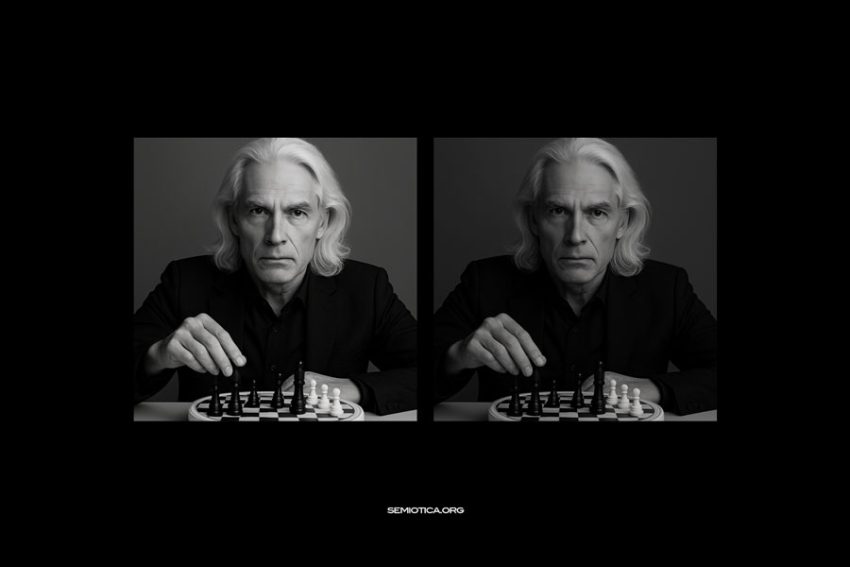La semiotica di Peirce, così come analizzata da Umberto Eco, consente di distinguere con precisione tre elementi interconnessi nella struttura del segno: oggetto dinamico, oggetto immediato e interpretante. Queste tre nozioni si rivelano fondamentali per comprendere come si costituisca il significato nella rappresentazione semiotica. L’oggetto dinamico è definito da Peirce come “ciò che in qualche modo costringe a determinare il segno…
Tag: Umberto Eco
Iconismo, convenzione ed effetto di realtà
La presenza di convenzioni non impedisce di riconoscere, nel flusso della comunicazione, forme di significazione che operano secondo un regime iconico. Tali forme sono motivate da un principio analogico condiviso, che organizza la relazione segnica e la rende immediatamente riconoscibile. In questo senso, l’iconismo appare spesso “trasparente” alla comunicazione e produce un marcato effetto di…
Segni iconici e relazione di somiglianza
La classificazione più tradizionale dei segni si fonda sul modo in cui si struttura la relazione segnica. Essa distingue tra segni iconici, indicali e simbolici, a seconda che il representamen sia simile all’oggetto, in connessione fisica con esso, oppure legato da una relazione arbitraria. I segni iconici rientrano nel primo caso: un segno iconico deve la sua…
What Does Semiotics Study
Semiotics belongs to that intermediate area of knowledge that constitutes the field of the human sciences: disciplines that are not founded on theorems or experiments, but neither on subjective opinions. It is a science of meaning, which investigates the ways in which human beings produce, interpret, and share meanings. As Ugo Volli reminds us, from…
Sceneggiature, script e competenza enciclopedica nella semiotica interpretativa
Nel quadro della semiotica interpretativa, la comprensione di un testo non dipende soltanto dalle informazioni esplicitamente enunciate, ma anche dall’attivazione di strutture di conoscenza condivise che permettono al lettore di colmare ciò che resta implicito. Tra queste strutture, un ruolo centrale è svolto dalle sceneggiature e dagli script, intesi come insiemi organizzati di conoscenze relative…
Abduzione e semiotica interpretativa: l’inferenza come scommessa
Nel quadro della semiotica interpretativa, l’attività del lettore si fonda su una forma di ragionamento che non coincide né con la deduzione né con l’induzione. L’interpretazione di un testo implica piuttosto un procedimento ipotetico, che Charles Sanders Peirce ha definito abduzione. Questo tipo di inferenza consente di formulare una spiegazione possibile a partire da un fatto…
Peirce. Il concetto di ground tra significato e rappresentazione
Umberto Eco dedica una parte rilevante della sua analisi della semiotica peirciana al concetto di ground, una categoria fondamentale per comprendere la struttura del segno e il suo funzionamento rappresentativo. Il ground è ciò che collega il segno al proprio oggetto, attraverso un profilo specifico o un carattere condiviso. È, nelle parole di Peirce, “una sorta di idea” che definisce…
Interpretante, oggetto e significato nel segno peirciano
In Lector in fabula, Umberto Eco ripercorre alcune delle definizioni fondamentali offerte da Peirce per chiarire la struttura triadica del segno. Nel 1895, Peirce scrive: “Un segno sta per qualcosa nei confronti dell’idea che esso produce o modifica… Ciò per cui sta viene chiamato il suo oggetto, ciò che veicola, il suo significato, e l’idea a…
Semiotica interpretativa e inferenza: previsioni, suspense, disgiunzioni di probabilità
Nella semiotica interpretativa, l’atto di lettura non consiste in una ricezione passiva del contenuto testuale, ma in un’attività continua di anticipazione e di verifica. Il lettore, mentre procede nella lettura, è costantemente chiamato ad avanzare ipotesi circa il significato della superficie espressiva e circa il possibile sviluppo degli eventi narrati. Interpretare un testo significa dunque…
Indeterminazione, disordine ed entropia: l’arte accanto ai saperi scientifici
Nel quadro tracciato da Paolucci, Opera aperta di Umberto Eco mostra come l’arte contemporanea reagisca a una serie di sollecitazioni provenienti da domini che, secondo la cultura dell’epoca, avrebbero dovuto restarle estranei: matematica, biologia, fisica, psicologia, logica. Nell’introduzione alla prima edizione, Eco identifica chiaramente questa costellazione di influenze. L’arte e gli artisti rispondono alla provocazione del “Caso,…









